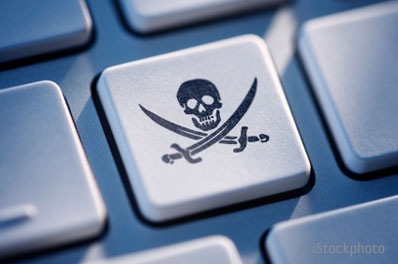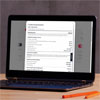 The entertainment industry has been working for years to stop the piracy of digital music, movies and TV shows. This week, those efforts are stepping up to a new level through something called the Copyright Alert System (CAS). Also known as the six-strike anti-piracy program, it’s a policy that seeks to educate people about copyrights and alert them if illegal downloads are taking place via their Internet connection.
The entertainment industry has been working for years to stop the piracy of digital music, movies and TV shows. This week, those efforts are stepping up to a new level through something called the Copyright Alert System (CAS). Also known as the six-strike anti-piracy program, it’s a policy that seeks to educate people about copyrights and alert them if illegal downloads are taking place via their Internet connection.
What has people riled about the new CAS is that the movie and music studios will notify your ISP about your suspected copyright violations and, if you receive enough warnings, you’ll actually be punished.
What is the Copyright Alert System
The CAS was crafted by the Center for Copyright Information and is supported by organizations such as the Recording Industry Association of American (RIAA) and the Motion Picture Association of America (MPPA). These groups watch public peer-to-peer networks and, if they see their content being shared illegally, they’ll trace the offending IP number and ask the ISP to issue the alert. The participating ISPs are AT&T, Cablevision, Comcast, Time Warner Cable and Verizon—all of which should be sending broadband customers details about how they will be employing measures to comply with the CAS.
The system is set to send out a maximum of six alerts, which get progressively more serious the more you get.
According to the Center for Copyright Information, “In general, there are two Educational Alerts, two ‘Acknowledgement’ Alerts that require a response from the Subscriber, and two ‘Mitigation’ Alerts that impose minor consequences to emphasize the seriousness of the problem.”
The use of the word “minor” is questionable, considering a mitigation alert could involve not only redirecting you to a landing page until you contact your ISP or acknowledge some kind of educational material. It also could mean the temporary throttling or suspension (as Cablevision has annouof your Internet service. Going back to dial-up speeds, even if only for 72 hours (which is how long Verizon will do it), would be vexing for most people and could be extremely troublesome for anyone who works from home.
The alerts stop coming after the sixth one because the organizations behind the COS know people still stealing files after a half dozen warnings aren’t the type to be deterred by an alert system. And while the Center for Copyright Information says no one’s Internet service will be terminated, there's no way to know if that won't change in the future.
What's especially concerning is that copyright holders don't have an infallible track record when it comes to being able to identify infringers. In the case of DMCA takedown requests (requests by copyright holders to take down web pages with copyright-infringing material), Google's transparency report reveals more than 15 million takedown requests since 2011, the majority of which have been issued within the last six months. Google says it rejects three percent of the requests, more than 450,000.
Digging through the rejections makes for some interesting reading, including some laughable requests by movie studios to remove links to legal copies of movies on Amazon, iTunes and other online merchants. There's even a Takedown Hall of Shame, created by the Electronic Frontier Foundation.
What if you receive an bogus alert from your ISP and are certain you haven’t pirated any digital content? The CAS doesn't make it easy to fight the process. To clear your name, you must file a claim within 14 days for an independent review by an arbitration panel—at a filing cost of $35 per claim. At least you get your money back if mediators determine you’re not guilty.
How to avoid getting caught up by the CAS
If you don't like the idea of getting caught up in the MPAA and RIAA's historically ham-fisted efforts to prevent pirating, there are some steps you should take now. First, make sure your wireless network is locked down so a neighbor or someone sitting outside your house can’t access your network and get you in trouble. Second, make sure everyone in your home (we're looking at you, teenagers) knows that sharing pirated movies and music is illegal and can result in serious consequences. You may even want to consider installing parental controls to make sure everyone is obeying the rules.
And if the idea of the MPAA and RIAA monitoring what you're doing online gives you the creeps, there are a number of solutions to browsing the Internet anonymously.
It's also important to make sure you receive any alerts the CAS might send you in a timely manner. So verify that the email address your ISP has on file is current and one that you check frequently.















From Melissa on March 01, 2013 :: 2:42 pm
What about public locations such as Starbucks, Panera, Barnes & Noble, etc… where wifi is free and many people are using it on any given day?
Reply
From Josh Kirschner on March 01, 2013 :: 5:06 pm
Those who manage public WiFi access points, such as Starbucks, have business account types with the ISPs. Business accounts are not being subjected to the CAS policies.
So, you may ask, if people who want to pirate can just go to their local Starbucks or get a VPN account, what will really be accomplished by this whole process? Good question.
If I had to make a prediction, the ISPs will back away from this whole thing over the next year or so amid a flood of complaints from their customers (i.e., the people who actually pay them money) about false accusations.
Reply
From Raj on January 01, 2017 :: 7:45 am
I like your comment
Reply